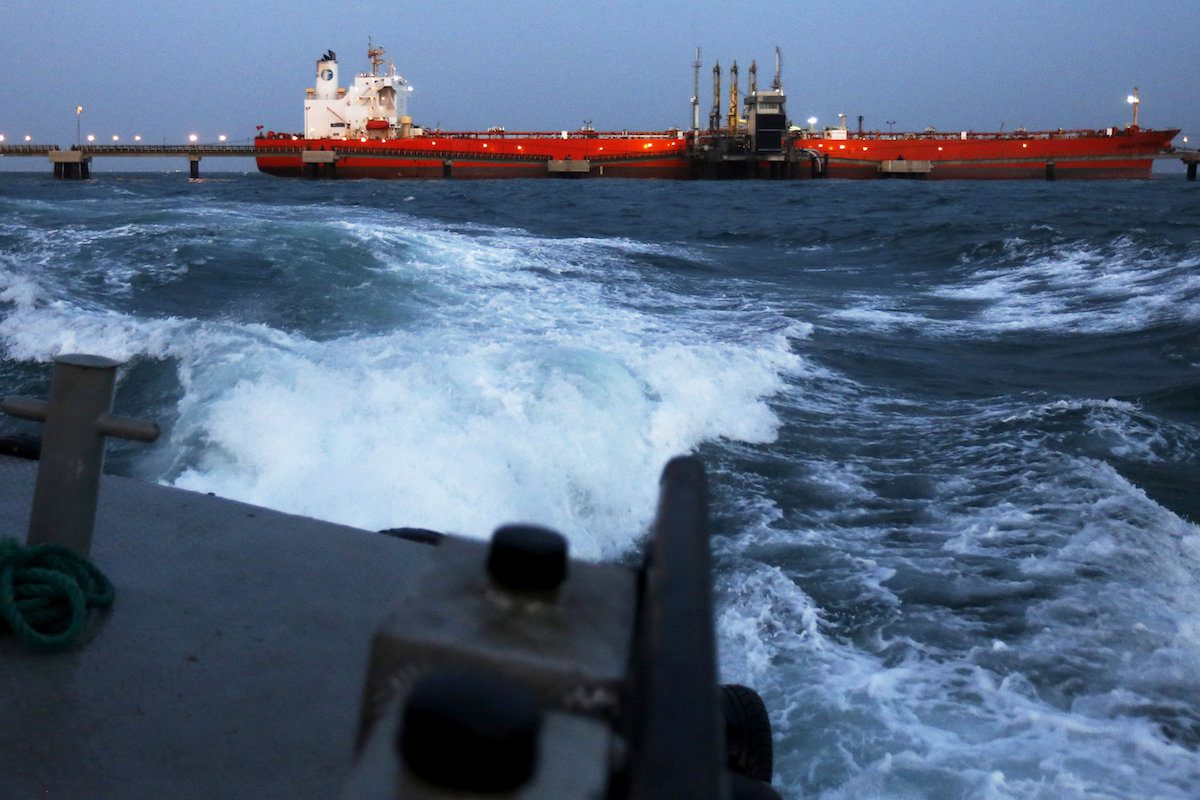FILE PHOTO: An oil tanker is docked while oil is pumped into it at the ships terminal of PDVSA’s Jose Antonio Anzoategui industrial complex in the state of Anzoategui April 15, 2015. REUTERS/Carlos Garcia Rawlins/File Photo
 By Marianna Parraga and Nivedita Bhattacharjee Aug 20 (Reuters) – U.S. producer ConocoPhillips and Venezuela’s PDVSA have reached a payment agreement on a $2-billion arbitration award, the companies said, suspending a dispute that blocked the state-run firm from exporting oil from most of its key Caribbean facilities.
By Marianna Parraga and Nivedita Bhattacharjee Aug 20 (Reuters) – U.S. producer ConocoPhillips and Venezuela’s PDVSA have reached a payment agreement on a $2-billion arbitration award, the companies said, suspending a dispute that blocked the state-run firm from exporting oil from most of its key Caribbean facilities.
Venezuela’s crude production, a major source of revenue, has fallen to a six-decade low this year as lack of investment, recession and hyperinflation pushed the OPEC-member country’s economy to near collapse. The settlement could restore a portion of lost exports by resuming shipping from the Caribbean.
Conoco will suspend legal enforcement of the arbitration award as long as payments continue, spokesman Daren Beaudo said. He declined to say if payments would be made in cash or crude oil, adding details of the agreement are confidential.
PDVSA confirmed a settlement was reached, but did not immediately elaborate on the payment terms.
Conoco in 2007 brought a claim against Venezuela before a World Bank court over the nationalization of two oil projects in the OPEC-member country and later asked the International Chamber of Commerce (ICC) to solve a dispute on the early termination of contracts with PDVSA.
The largest arbitration case went before the World Bank’s International Centre for Settlement of Investment Disputes (ICSID), the company has said, adding a final award is possible by year end.
“Having missed payments to bondholders in recent months, PDVSA could have built a cushion for paying Conoco,” said Francisco Monaldi, a Latin American energy researcher at Rice University’s Baker Institute.
“PDVSA will have a break, recovering export capacity in the Caribbean, as long as it continues paying Conoco on time. Conoco could focus now on the wider case, before ICSID,” he added.
The PDVSA-Conoco agreement came ahead of court hearings scheduled for next month in Bonaire and Aruba that could have enabled Conoco to begin selling PDVSA assets seized through court attachments.
In Curacao, where efforts are underway to replace PDVSA as operator of the island’s 335,000-barrel-per-day Isla refinery, the agreement was welcomed by the government.
The ICC ruled in favor of Conoco in April, but no payment was made by PDVSA in the following weeks. In May, Conoco moved to seize most of PDVSA’s Caribbean assets, knocking down the state-run company’s exports, especially to Asian buyers.
SPLIT PAYMENT
PDVSA agreed to make an initial payment of around $500 million within 90 days of signing the agreement. The remainder is to be paid quarterly over a period of 4-1/2 years, Conoco said in a statement.
Under a new military-led management appointed late last year, PDVSA increasingly has struggled to produce, refine and export crude oil amid a severe lack of cash, and faced sanctions imposed last year by the U.S. government.
Previous agreements by the Venezuelan government and its state-run companies over dozens of arbitrations and legal claims related to late President Hugo Chavez’s nationalizations a decade ago, have mostly failed to fulfill the terms, ending in renegotiations and legal disputes.
“What makes this situation and Conoco’s claim unique is the amount of creditors lining up behind the very same Venezuelan assets,” Jay Auslander, partner at New-York based law firm Wilk Auslander, said.
“So Venezuela itself has ample reason to take care of the Conoco problem. How this will all play out over time, though, remains uncertain, because Venezuela may simply lack the liquidity to fully perform.”
Conoco said it will make sure that the settlement meets U.S. regulatory requirements, including any applicable sanctions against Venezuela.
Conoco and Exxon Mobil left Venezuela after they could not reach deals to convert their projects into joint ventures controlled by PDVSA. Its assets were then expropriated.
After receiving two arbitration awards related to the nationalization of its assets in Venezuela, Exxon said in its most recent quarterly report that the South American country this year finished paying $260 million related to its La Ceiba project.
Conoco’s shares were up 1.5 percent at $70.83 in afternoon trading. (Reporting by Marianna Parraga in Mexico City, Nivedita Bhattacharjee in Bengaluru, Sailu Urribarri in Jacksonville, Alexandra Ulmer in Caracas and Gary McWilliams in Houston; Editing by Anil D’Silva, Saumyadeb Chakrabarty and Susan Thomas)
(c) Copyright Thomson Reuters 2018.

 Join The Club
Join The Club











